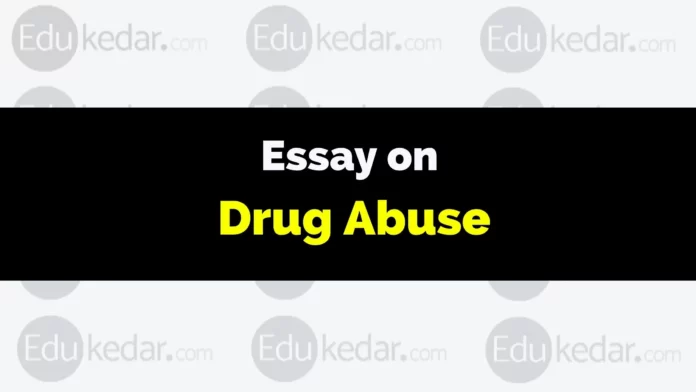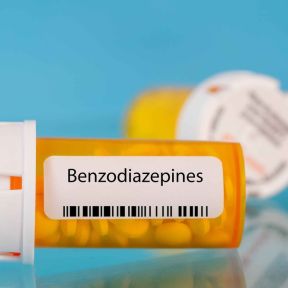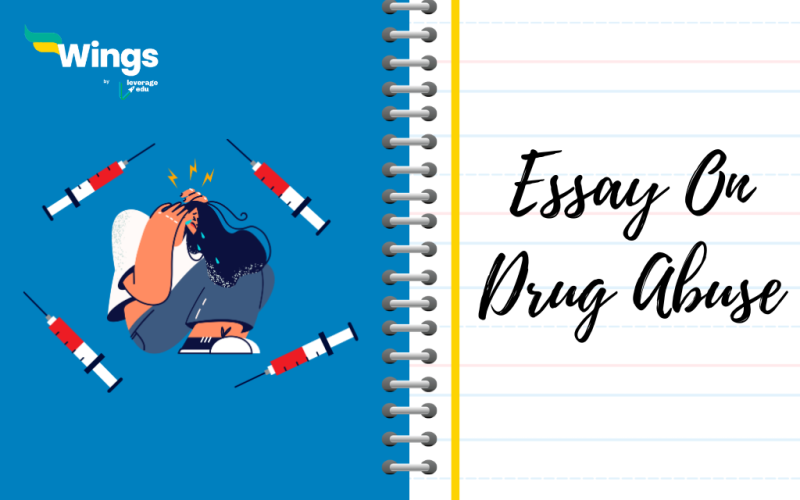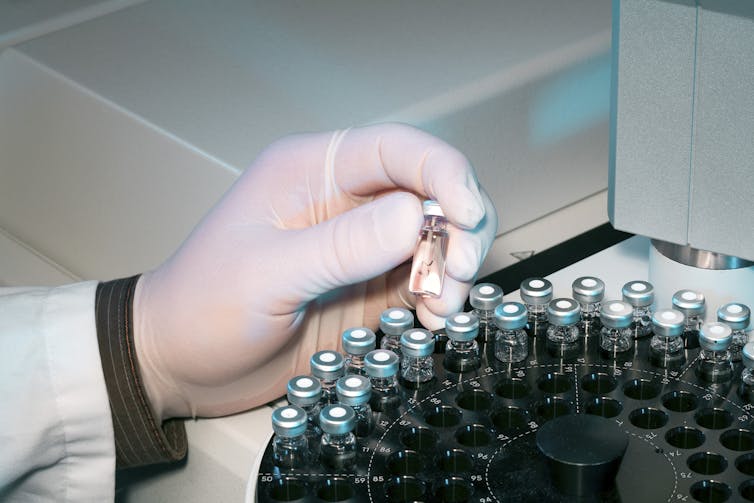- Engineering
- Write For Us
- Privacy Policy


Essay on Drug Abuse

Here we have shared the Essay on Drug Abuse in detail so you can use it in your exam or assignment of 150, 250, 400, 500, or 1000 words.
You can use this Essay on Drug Abuse in any assignment or project whether you are in school (class 10th or 12th), college, or preparing for answer writing in competitive exams.
Topics covered in this article.
Essay on Drug Abuse in 150 words
Essay on drug abuse in 250-300 words, essay on drug abuse in 500-1000 words.
Drug abuse is a global issue that poses serious risks to individuals and society. It involves the harmful and excessive use of drugs, leading to physical and mental health problems. Drug abuse can result in addiction, organ damage, cognitive impairment, and social and economic difficulties. Prevention efforts should focus on education, raising awareness about the dangers of drug abuse, and promoting healthy lifestyles. Access to quality healthcare and addiction treatment services is crucial for recovery. Strengthening law enforcement measures against drug trafficking is necessary to address the supply side of the problem. Creating supportive environments and opportunities for positive engagement can help prevent drug abuse. By taking collective action, we can combat drug abuse and build healthier communities.
Drug abuse is a growing global concern that poses significant risks to individuals, families, and communities. It refers to the excessive and harmful use of drugs, both legal and illegal, that have negative effects on physical and mental health.
Drug abuse has severe consequences for individuals and society. Physically, drug abuse can lead to addiction, damage vital organs, and increase the risk of overdose. Mentally, it can cause cognitive impairment, and psychological disorders, and deteriorate overall well-being. Additionally, drug abuse often leads to social and economic problems, such as strained relationships, loss of employment, and criminal activities.
Preventing drug abuse requires a multi-faceted approach. Education and awareness programs play a crucial role in informing individuals about the dangers of drug abuse and promoting healthy lifestyle choices. Access to quality healthcare and addiction treatment services is vital to help individuals recover from substance abuse. Strengthening law enforcement efforts to curb drug trafficking and promoting international cooperation is also essential to address the supply side of the issue.
Community support and a nurturing environment are critical in preventing drug abuse. Creating opportunities for individuals, especially young people, to engage in positive activities and providing social support systems can serve as protective factors against drug abuse.
In conclusion, drug abuse is a significant societal problem with detrimental effects on individuals and communities. It requires a comprehensive approach involving education, prevention, treatment, and enforcement. By addressing the root causes, raising awareness, and providing support to those affected, we can combat drug abuse and create a healthier and safer society for all.
Title: Drug Abuse – A Global Crisis Demanding Urgent Action
Introduction :
Drug abuse is a pressing global issue that poses significant risks to individuals, families, and communities. It refers to the excessive and harmful use of drugs, both legal and illegal, that have detrimental effects on physical and mental health. This essay explores the causes and consequences of drug abuse, the social and economic impact, prevention and treatment strategies, and the importance of raising awareness and fostering supportive communities in addressing this crisis.
Causes and Factors Contributing to Drug Abuse
Several factors contribute to drug abuse. Genetic predisposition, peer pressure, stress, trauma, and environmental influences play a role in initiating substance use. The availability and accessibility of drugs, as well as societal norms and cultural acceptance, also influence drug abuse patterns. Additionally, underlying mental health issues and co-occurring disorders can drive individuals to self-medicate with drugs.
Consequences of Drug Abuse
Drug abuse has devastating consequences on individuals and society. Physically, drug abuse can lead to addiction, tolerance, and withdrawal symptoms. Substance abuse affects vital organs, impairs cognitive function, and increases the risk of accidents and injuries. Mental health disorders, such as depression, anxiety, and psychosis, are often associated with drug abuse. Substance abuse also takes a toll on relationships, leading to strained family dynamics, social isolation, and financial instability. The social and economic costs of drug abuse include increased healthcare expenses, decreased productivity, and the burden on criminal justice systems.
Prevention and Education
Preventing drug abuse requires a comprehensive and multi-faceted approach. Education and awareness programs are essential in schools, communities, and the media to inform individuals about the risks and consequences of drug abuse. Promoting healthy coping mechanisms, stress management skills, and decision-making abilities can empower individuals to resist peer pressure and make informed choices. Early intervention programs that identify at-risk individuals and provide support and resources are crucial in preventing substance abuse.
Treatment and Recovery
Access to quality healthcare and evidence-based addiction treatment is vital in addressing drug abuse. Treatment options include detoxification, counseling, behavioral therapies, and medication-assisted treatments. Rehabilitation centers, support groups, and outpatient programs provide a continuum of care for individuals seeking recovery. Holistic approaches, such as addressing co-occurring mental health disorders and promoting healthy lifestyles, contribute to successful long-term recovery. Support from family, friends, and communities plays a significant role in sustaining recovery and preventing relapse.
Law Enforcement and Drug Policies
Effective law enforcement efforts are necessary to disrupt drug trafficking and dismantle illicit drug networks. International cooperation and collaboration are crucial in combating the global drug trade. Additionally, drug policies should focus on a balanced approach that combines law enforcement with prevention, treatment, and harm reduction strategies. Shifting the emphasis from punitive measures toward prevention and rehabilitation can lead to more effective outcomes.
Creating Supportive Communities:
Fostering supportive communities is vital in addressing drug abuse. Communities should provide resources, social support networks, and opportunities for positive engagement. This includes promoting healthy recreational activities, providing vocational training, and creating safe spaces for individuals in recovery. Reducing the stigma associated with drug abuse and encouraging empathy and understanding are crucial to building a compassionate and supportive environment.
Conclusion :
Drug abuse remains a complex and multifaceted issue with far-reaching consequences. By addressing the causes, raising awareness, implementing preventive measures, providing quality treatment and support services, and fostering supportive communities, we can combat drug abuse and alleviate its impact. It requires collaboration and a collective effort from individuals, communities, governments, and organizations to build a society that is resilient against the scourge of drug abuse. Through education, prevention, treatment, and compassion, we can pave the way toward a healthier and drug-free future.
Related Articles More From Author
What is pharmacognosy, essay on community service, essay on plagiarism.
Causes of Addiction
Reviewed by Psychology Today Staff
There are many theories about the causes of addiction, the use and abuse of legal and illegal psychoactive substances. Biology, psychology, and social and cultural elements all play a role in the enormously complex causal bouquet that results in addiction , and different theories weight the elements differently. Together they reflect the fact that there is no one path to addiction, and no one factor makes addiction an inevitable outcome. Addiction can’t happen without exposure to agents, but that is hardly the determining factor. Addiction is not a property of the substance ingested or activity engaged in.
Instead, research indicates that it is more related to what else is, or isn’t, going on in a person’s life that makes the sensation a substance induces so attractive. Among the many factors that have been shown to influence the development of an addiction are feelings about oneself, emotional state, quality of family relationships, social ties, community attributes, employment status, stress reactivity and coping skills, physical or emotional pain, personality traits, educational opportunities, compelling goals and progress toward them, opportunities for and access to rewards in life, as well as physiological responses. While no factor predominates, each exerts some degree of influence.
On This Page
- What are the most common causes of addiction?
- What are the most common substances of abuse?
- Are some substances more addictive than others?
- Are there risk factors for addiction?
- Do genes play a role in addiction?
- What biological factors influence addiction?
- What environmental factors influence addiction?
- Does stress play a role in addiction?
- What role does childhood trauma play in addiction?
- Is there a brain malfunction that causes addiction?
- If a family member was addicted, will I become addicted?
- Is there an addictive personality?
- Why do some people become addicted while others do not?
- Can someone get addicted by using a substance once?
- Can drug addiction be prevented?
There are no substances (or activities) that universally or uniformly cause people to become addicted. And the vast majority of people exposed to most substances (or activities) considered addictive do not in fact develop addiction to them. Rather, a very complex array of cultural factors, social factors, and situational factors mingle with psychological factors, biological factors, and even personal values to influence the possibility of addiction.
Many different theories of addiction exist because they weight the role of contributing factors differently. Some current models of addiction emphasize the causative role of individual variations in biology or genes that make a substance or experience feel more or less pleasurable. Many models of addiction highlight the causative role of individual psychological factors, whether personality factors such as impulsiveness or sensation-seeking, or psychopathology such as the negative effects of early trauma. Other models of addiction emphasize the role that social and economic factors play in shaping behavior, such as the strength of family and peer relationships and the presence of absence of educational and employment opportunities.
Around the world and in the U.S., nicotine is the most widely used addictive substance; tobacco causes a reported 40 million deaths worldwide. According to the National Institute of Drug Abuse, smoking kills more than 1,000 Americans every day, and although tobacco use is generally declining in the U.S. its use is increasing among some groups of young people, especially in the form of vaping, or inhaling nicotine vapors .
Alcohol in some form is widely used for pleasurable purposes and is an important part of the social fabric worldwide, today as in ancient times. Nevertheless, according to the National Institute on Alcohol Abuse and Alcoholism, 14.6 million U.S. adults over the age of 18 have alcohol use disorder, marked by uncontrolled drinking. Around the world, 240 million people are reportedly dependent on alcohol; alcohol abuse is most prevalent in Eastern Europe and least prevalent among Asians.
Painkillers including prescription opiates such as oxycodone and fentanyl and the illegal drug heroin account for more than 10 percent of all addictions in the U.S, affecting more than 2.5 million people, according to the American Society of Addiction Medicine.
Cocaine is a stimulant that is often taken intranasally (snorted) or injected intravenously but is considered to have the most potential for addiction because of the fast, intense high when smoked in the form of “crack.” Other stimulants that are subject to abuse are amphetamines, widely prescribed to combat attention deficit hyperactivity disorder and to foster alertness and energy.
Depressive agents such as sedatives and tranquilizers are widely used medically to combat stress, anxiety, and sleep disorders , but NIDA reports that 3.5 to 5 percent of the population uses tranquilizers and sleeping pills nonmedically.
The synthetic stimulant methamphetamine is widely considered one of the most addictive agents. Often inhaled, it directly affects the dopamine and other neurotransmitter systems system to produce an extremely fast and intense—but short-lived—high, with an altered sense of energy and power. Further, by changing the responsiveness of dopamine receptors, methamphetamine blunts the experience of reward from normal sources of pleasure.
Crack cocaine is also considered highly addictive. Cocaine processed so that it can be smoked, it enters the blood stream rapidly and produces a rapid “rush” of a high; the immediate response becomes powerfully reinforcing, driving the motivation to repeat the experience.
There are many risk factors for addiction, from individual factors such as stress tolerance and personality makeup to social factors such as friendships and educational and job opportunities. They interact in dynamic ways unique to each person. But what addiction may come down to for everyone is the emotional and physical appeal of a substance at a particular moment in a person’s life. The effects of drugs are pleasurable and rewarding only in relation to how a person feels emotionally and physically in the context of his or her relationships and social life and other opportunities for development and reward.
Some studies show that genes can account for as much as 50 percent of a person’s risk for addiction, although the degree of genetic influence shifts in importance over time. For example, environmental factors such as family and social relationships are more strongly tied to use of alcohol and nicotine in adolescence than later in life. Nevertheless, there is no single gene for addiction nor even a group of genes.
However, there are a number of personality traits, each of which is partly genetically influenced, that contribute to the risk of addiction. These include impulsiveness, frustration tolerance, and sensitivity to rejection. Impulsivity is thought to play its strongest role in the early stages of addiction, driving the motivation for seeking drugs.
Biology contributes to addiction in ways beyond genes. How the body metabolizes, or breaks down and eliminates, foreign substances such as drugs or alcohol is heavily dependent on the presence of various enzymes, and they may vary significantly between individuals and even between ethnic groups.
For example, research shows that the Japanese have unique variations of certain alcohol-metabolizing enzymes that are not present in other populations, deterring alcohol consumption— and alcoholism—because it quickly gives rise to uncomfortable body sensations. Biological factors such as enzyme profile can influence the amount of alcohol people ingest, the pleasantness of the experience, harmful effects on the body, and the development of disease.
There are many factors that influence addiction beyond genes and biology. One of the most significant is t he family milieu and early life experiences . Family interactions, parenting style, and levels of supervision all play a role in development of coping skills and susceptibility to mental health problems. Studies have linked authoritarian or neglectful parenting, family violence, and divorce to increased likelihood of substance use problems later in life. Growing up with strong ties to and a sense of belonging—to a family, to a belief tradition, to a culture—are known to be protective against addiction.
Peers play an enormous role in addiction susceptibility, especially among teens and young adults; most people use drugs for the first time as teenagers. Misuse of prescription drugs, for example, is highest among young adults aged 18 to 25, according to the National Institute of Drug Abuse. Alcohol is the most commonly abused drug among adolescents in the United States. The behavior patterns of friends influence everyone in the group. Further, psychological distress, especially depression and anxiety , has been shown to play an important role in such substance use.
Stress is a risk factor for many kinds of nonadaptive behavior, and addiction is one. Researchers have long linked the effects of chronic stress to alcohol use. Stress relief may enhance the pleasurable effect of any substance. There is some research to support the view that adverse events in childhood and in adulthood change the responsiveness of brain systems. Adverse early life events and cumulative negative events in adulthood—especially those that are both unpredictable and emotionally distressing—alter reactivity of brain structures that govern learning, motivation, the control of distress and control of impulsiveness to increase susceptibility to addiction and to influence the risk of relapse. Stress also increases the risk of mood and anxiety disorders, which are linked to addiction.
Adverse childhood experiences (ACEs) such as trauma, especially combined with an unpredictable and chaotic childhood, pose a risk factor for many kinds of maladaptive behaviors and poor health outcomes . Studies show that having multiple ACEs puts children at risk of poor school performance, unemployment, and high-risk health behaviors including smoking and drug use.
Prolonged stress during childhood dysregulates the normal stress response and, through overproduction of cortisol, is especially harmful to the brain’s hippocampus, impairing memory and learning. Severe or sustained early life adversity shifts the course of brain development and can lastingly impair emotion regulation and cognitive development. What is more, it can sensitize the stress response system so that it overresponds to minimal levels of threat, making people feel easily overwhelmed by life’s normal difficulties. Research shows a strong link between ACEs and opioid drug abuse as well as alcoholism.
The common but mistaken view of addiction as a brain disease suggests that there is some malfunction in the brain that leads to addiction. But that is not the case. Studies show that repeated use of a substance (or an activity), encouraged by a surge in dopamine, creates changes in the wiring of the brain—and those changes are reversible after drug use stops.
Neuroscience research supports the idea that addiction is a habit that becomes deeply entrenched and self-perpetuating , rewiring the circuitry of the brain as it is repeated. The repetition of a highly pleasurable experience—drugs, gambling—alters neurons; they adjust their wiring to become increasingly efficient at the experience. They prune away their capacity to respond to other inputs. It is a form of deeply engraved learning. As drug use stops, engaging in other rewarding activities rewires the brain to find interest and pleasure in non-drug pursuits.
The vast majority of children whose parents abuse alcohol or drugs do not grow up to do the same. However, they are at some increased risk for doing so, and there are a number of reasons why. For one, they are exposed to those substances, and exposure during early adolescence may especially influence substance use.
For another, they may inherit whatever genetic or biological vulnerabilities laid the groundwork for a parental addiction. But they may also be more prone to addiction because they suffer from cognitive, emotional, or behavioral problems known to arise in children as a consequence of growing up in a home marked by substance use; for example, as children they are at increased risk of neglect, abuse, or a poor quality parent-child relationship .
It is a myth that there is some personality factor that is specific for the development of addiction and makes addiction likely. There are a number of personality traits widely shared in the population that contribute to the risk of developing an addiction, usually in indirect ways. For example, people prone to thrill-seeking may be more likely than others to find themselves in situations where drugs are used or to experiment with any number of activities—think: bungee jumping, base-jumping—or substances that provide outsize rewards.
Studies show that those who are high in the trait of neuroticism—they are prone to experiencing negative emotions—are overwhelmed by minor frustrations and interpret ordinary situations as stressful. Neuroticism is linked to a wide array of mental health problems, including anxiety, depression, and eating disorders as well as substance abuse. Neuroticism is also linked to a diminished quality of life, another factor that could increase the allure of substance use.
There is some evidence that natural variation in genetic makeup of the dopamine system may influence who gets addicted. Dopamine is the neurotransmitter activated by rewarding activities as a way of increasing the likelihood of engaging in such activities in the future. Having a relationship, getting a promotion, doing something creative—those are normal ways of stimulating the reward system. Illicit drug use short-circuits that process and directly boosts dopamine levels.
Some people may be more prone to addiction because they feel less pleasure through natural routes, such as from work, friendships, and romance. Their genetic makeup inclines them to develop such personality traits as thrill-seeking. Their craving for risk and novelty takes the fear out of drug use and the huge dopamine boost powerfully reinforces the motivation to seek the reward over and over again.
A person cannot get addicted to a substance without exposure to the substance, but exposure alone does not lead to addiction. Addiction develops only after repeated use of a substance. One use of a substance can produce a pleasurable effect that motivates interest in repeating the experience. But the experience of pleasure is relative; it hinges in part on biology and very much on what else there is going on in a persons life that is meaningful or rewarding.
In its simplest form, drug addiction can be seen as a way of hacking the brain —of finding a shortcut to feelings of emotional reward by bypassing the normal activities that stimulate such sensations and directly manipulating the neurochemicals responsible for them. To a very large degree, brain hacks become appealing when there are restricted opportunities for meaning and for pleasure other than the response to drugs.
Just as recovery from addiction requires focusing on rewarding activities other than drug use , so does prevention. The definition of a meaningful life varies from person to person, but psychology has long identified its components—feelings of self-respect; meaningful relationships that create a sense of belonging; opportunities for growth and development; work that is engaging or rewarding; opportunities for enjoyment and pleasure.

The number of drug overdoses in this country went down in 2023. But not enough. Here's where we stand, including thoughts on how to save more lives.

U.S. alcohol guidelines are changing as health concerns increase. Alcohol-free cocktails and beer, along with cannabis-infused beverages, are gaining users.

Discover how doing less can break your worst habits with the EAT cycle. Explore, accept, and transform for lasting change.

I've studied social media’s impact on the developing brain, so I’m all for warning labels. In fact, I'd argue it's the least we can do to protect our young people.

What type of person starts a fire? The answer may depend on where they live.

Discover the surprising connection between boredom, happiness, and the choices we make—and learn how to cultivate a fulfilling life beyond the pursuit of fleeting thrills.

The role of spirituality in addiction recovery is often misunderstood. IBut spiritual freedom can be part of healthy recovery if one understand it more clearly.

Patients legitimately prescribed benzos become addicted. When their provider retires or moves, they may not find anyone willing to take over. Severe traumatizing withdrawal ensues.

When I was in medical school, neither addiction psychiatry nor addiction medicine existed. Dr. David Smith and a small group of pioneers changed all that.

A large new meta-study on benzodiazepine harms from long-term use finds evidence of volume loss of the hippocampus and amygdala.
- Find a Therapist
- Find a Treatment Center
- Find a Psychiatrist
- Find a Support Group
- Find Online Therapy
- United States
- Brooklyn, NY
- Chicago, IL
- Houston, TX
- Los Angeles, CA
- New York, NY
- Portland, OR
- San Diego, CA
- San Francisco, CA
- Seattle, WA
- Washington, DC
- Asperger's
- Bipolar Disorder
- Chronic Pain
- Eating Disorders
- Passive Aggression
- Personality
- Goal Setting
- Positive Psychology
- Stopping Smoking
- Low Sexual Desire
- Relationships
- Child Development
- Self Tests NEW
- Therapy Center
- Diagnosis Dictionary
- Types of Therapy

Sticking up for yourself is no easy task. But there are concrete skills you can use to hone your assertiveness and advocate for yourself.
- Emotional Intelligence
- Gaslighting
- Affective Forecasting
- Neuroscience

Essay on Drug Abuse
Students are often asked to write an essay on Drug Abuse in their schools and colleges. And if you’re also looking for the same, we have created 100-word, 250-word, and 500-word essays on the topic.
Let’s take a look…
100 Words Essay on Drug Abuse
Introduction to drug abuse.
Drug abuse refers to the harmful or unhealthy use of substances, including alcohol and illicit drugs. It’s a serious issue affecting people worldwide.
Effects of Drug Abuse
Drug abuse can lead to physical and psychological damage. It can cause diseases, impair judgement, and lead to criminal behavior.
Prevention of Drug Abuse
Prevention involves education about the dangers of drugs. Schools and communities play key roles in this. Support from family and friends is also crucial.
In conclusion, drug abuse is a grave problem. However, through education and support, it can be prevented.
250 Words Essay on Drug Abuse
Introduction, causes of drug abuse.
Drug abuse often originates from a complex interplay of factors. Biological predispositions, such as genetics, can make individuals more susceptible to drug addiction. Environmental factors like peer pressure, family dynamics, and socioeconomic status also contribute significantly.
Consequences of Drug Abuse
The implications of drug abuse are far-reaching and devastating. Physically, it can lead to severe health issues, including heart disease, liver damage, and neurological complications. Psychologically, it can result in mental health disorders like depression and anxiety. Socially, drug abuse can lead to broken relationships, unemployment, and criminal activities.
Prevention and Treatment
Preventing drug abuse requires a multipronged approach. Education and awareness programs can help individuals understand the risks associated with drug use. Early intervention programs can identify at-risk individuals and provide them with the necessary support. Treatment for drug abuse typically involves a combination of medication and therapy to help individuals overcome their addiction.
In conclusion, drug abuse is a multifaceted issue requiring comprehensive solutions. By understanding the causes and consequences, and implementing effective prevention and treatment strategies, we can make strides towards mitigating this global problem.
500 Words Essay on Drug Abuse
Drug abuse, also known as substance abuse, is a critical issue that has plagued societies around the world. It is characterized by the harmful or hazardous use of psychoactive substances, such as illicit drugs or alcohol, leading to addiction, health problems, social issues, and even death.
The Nature and Extent of Drug Abuse
There are numerous causes of drug abuse, often complex and intertwined. Biological factors, such as genetics and mental health conditions, can predispose an individual to substance abuse. Environmental factors, including family dynamics, peer influence, and socioeconomic status, also play a significant role. Additionally, psychological elements, such as stress, trauma, and low self-esteem, can trigger drug abuse.
Impacts of Drug Abuse
Drug abuse has far-reaching consequences. Health-wise, it can lead to both physical and mental health problems, including heart disease, liver damage, and mental disorders like depression and anxiety. Socially, drug abuse can result in broken relationships, job loss, and criminal activities. Economically, it imposes a significant burden on healthcare systems and reduces productivity.
Prevention and Treatment of Drug Abuse
Drug abuse is a pressing global issue that demands urgent attention. While it is a complex problem with numerous causes and impacts, it is not insurmountable. Through a comprehensive approach that includes education, policy changes, and effective treatment, societies can combat drug abuse and its devastating effects. The fight against drug abuse is not just the responsibility of the individual, but of the entire community.
That’s it! I hope the essay helped you.
Happy studying!
Leave a Reply Cancel reply
Your email address will not be published. Required fields are marked *

We use cookies to enhance our website for you. Proceed if you agree to this policy or learn more about it.
- Essay Database >
- Essay Examples >
- Essays Topics >
- Essay on Law
Sample Essay On Cause And Effects Of Drug Abuse
Type of paper: Essay
Topic: Law , Addiction , Human , Drug Abuse , Brain , Criminal Justice , Crime , Drugs
Published: 03/29/2020
ORDER PAPER LIKE THIS
Many causes and effects of drug addiction are both related as to why a person is using illegal drugs and the outcome of becoming a drug addict. Being a drug addict creates a negative cycle, which undeniably precipitates some anomalies in the human brain. The process will result in strong cravings as well as involuntary inclination that prompt to use drugs. Drug addiction is a very serious threat to public safety and public health, not only in the United States, but also all over the world. Drug addiction develops in many ways. To better understand the causes of addiction, it would be essential to know how the use of illegal drugs is affecting the human brain. The human brain has its natural capability to reinforce and identify positive experiences. As an example, if a human eats his or her favorite food or puts a warm blanket during the cold winter nights, the brain will naturally release feel-good chemicals such as dopamine. By repeatedly experiencing these events, drugs will reinforce the human behavior through a process that teaches the brain to expect the positive experiences or pleasant sensations. However, none of these addiction causes will happen if there are no supporting factors that provoke people in getting addicted to drugs. Some people may not understand why other individuals are becoming addicted to drugs and how it changes the human brain’s activity to promote compulsive abuse of drugs. Sometimes, some people mistakenly observe drug addiction and abuse as one of the social problems. One of the causes of a person’s drug addiction is the surroundings. A person who lives in a community, where drug temptations are present, it is more likely that he or she may be with a group of people who use drugs. Therefore, the possibility of being in a group of drug users can be one of the causes of a person’s drug addiction. Another that factor that causes drug addiction is the person’s behavior. This normally happens to a person who normally gets along with a group of people who have similar behavior just like him. He will easily be convinced to use illegal drugs initially until he falls into addiction eventually. In some points, causes of drug abuse can be a personal or family matter. There may have a time that parents and guardian of a potential drug user may lack family openness, in which communication between family members is less. Therefore, there could be an attention deficiency, which they normally found from their peers. Experimentation many things including drug abuse could happen during the teenage years, which can worsen a person’s drug addiction in the long run. There could be hundreds of causes why a person becomes a drug addict. Along with this, there are also numerous effects that being a drug addict could provide. One of the effects of drug addiction could be a person’s attitude. A person who is addicted to drugs could turn his attitude to be a hot-tempered one. He or she tends to become irate as a response even on simple things. As a result, his or her relationship with her family and friends could become worse as his attitude becomes worse. In addition, drug addiction changes the human brain’s function. A drug addict will lose his self-control and his ability to recognize sounds. These effects could appear overtime as the person continues to use illegal drugs. The effects of being a drug user may depend on the length of time a person being into it. The longer a person uses illegal drugs, the more likely that he or she may have worse effects eventually. Besides emotional and social reasons, a person’s willingness to stop or continue using illegal drugs also contributes to being whether or not he is a drug abuser.

Cite this page
Share with friends using:
Removal Request

Finished papers: 1219
This paper is created by writer with
ID 284979712
If you want your paper to be:
Well-researched, fact-checked, and accurate
Original, fresh, based on current data
Eloquently written and immaculately formatted
275 words = 1 page double-spaced

Get your papers done by pros!
Other Pages
Imitation argumentative essays, highway creative writings, fertilizer creative writings, tongue creative writings, valuation creative writings, widow creative writings, stool creative writings, opponent creative writings, sword creative writings, spy creative writings, tiger creative writings, rushton essays, seidl essays, joan essays, reporting entity essays, organizational communication essays, drug abusers essays, substance abuse and mental health services administration essays, sixteen years essays, guildenstern essays, matthew essays, mtor signaling in carcinogenesis article review example, free case study about ethical issue application paper expansion at what cost, example of critical thinking on quot we were incredibly lucky, example of entrepreneurial thinking case study, free report about public relations in action, german south west africa essay, free research paper on the armenian genocide, good article review about gis solutions for environmental management, org behavior essay examples, jesus signs and wonders research papers examples, manifesto essays examples, case study on the joe chaney case, cognitive behavior therapy an analysis critique and application research paper examples, free report about managing communication information and knowledge, good research paper about federal information security management act fisma 2002, technology essays example, causal determinism critical thinking, example of book review on summarizing, good course work on use of performance enhancing substances in sports, good essay on managing innovation, good art architecture essay example.
Password recovery email has been sent to [email protected]
Use your new password to log in
You are not register!
By clicking Register, you agree to our Terms of Service and that you have read our Privacy Policy .
Now you can download documents directly to your device!
Check your email! An email with your password has already been sent to you! Now you can download documents directly to your device.
or Use the QR code to Save this Paper to Your Phone
The sample is NOT original!
Short on a deadline?
Don't waste time. Get help with 11% off using code - GETWOWED
No, thanks! I'm fine with missing my deadline

45,000+ students realised their study abroad dream with us. Take the first step today
Meet top uk universities from the comfort of your home, here’s your new year gift, one app for all your, study abroad needs, start your journey, track your progress, grow with the community and so much more.

Verification Code
An OTP has been sent to your registered mobile no. Please verify

Thanks for your comment !
Our team will review it before it's shown to our readers.

- School Education /
Essay on Drug Abuse in 250 and 500 Words in English for Students
- Updated on
- Apr 2, 2024

Drug abuse refers to the excessive and frequent consumption of drugs. Drug abuse can have several harmful effects on our mental and physical health. Ronald Reagan, the 40th President of the USA, passed the Anti-Drug Abuse Act of 1986 and initiated the War on Drugs . He said, ‘Let us not forget who we are. Drug abuse is a repudiation of everything America is.’

Consuming drugs not only harms the individual himself but also affects society as a whole. Studies have shown that people who consume drugs become addicted to it. This addiction turns into substance abuse, resulting in self-damage, behaviour changes, mood swings, unnecessary weight loss, and several other health problems. Let’s understand what drug abuse is and how to fight it.
Table of Contents
- 1 Essay on Drug Abuse in 250 Words
- 2.1 Why Do People Consume Drugs?
- 2.2 Why Is Drug Abuse Bad?
- 2.3 Laws in India Against Drug Consumption
- 2.4 Steps to Prevent Drug Addiction
- 2.5 Conclusion
- 3 10 Lines Essay on Drug Abuse
Quick Read: Essay on CAA (Citizenship Amendment Act)
Essay on Drug Abuse in 250 Words
‘When people consume drugs regularly and become addicted to it, it is known as drug abuse. In medical terminology, drugs means medicines. However, the consumption of drugs is for non-medical purposes. It involves the consumption of substances in illegal and harmful ways, such as swallowing, inhaling, or injecting. When drugs are consumed, they are mixed into our bloodstream, affecting our neural system and brain functioning.
The Indian government has taken significant steps to help reduce the consumption of drugs. In 1985, the Narcotics Drugs and Psychotropic Substances Act came into force. This act replaced the Opium Act of 1857, the Opium Act of 1878, and the Dangerous Drugs Act of 1930.
Drug abuse can lead to addiction, where a person becomes physically or psychologically dependent on the substance and experiences withdrawal symptoms when attempting to stop using it.
Drug abuse can have serious consequences for the individual and society as a whole. On an individual level, drugs can damage physical health, including organ damage, infectious diseases, and overdose fatalities. Not only this, a person already suffering from mental health disorders will face more harmful aftereffects. Addiction disrupts our cognitive functioning and impairs our decision-making abilities.
To fight drug abuse, we need collective action from all sections of society. Medical professionals say that early intervention and screening programmes can identify individuals at risk of substance misuse and provide them with the necessary support services. Educating people, especially those who are at-risk, about drug abuse and its harmful effects can significantly help reduce their consumption.
Drug abuse is serious and it must be addressed. Drug abuse is killing youth and society. Therefore, it is an urgent topic to address, and only through sustainable and collective efforts can we address this problem.
Quick Read: Success in Life Speech
Essay on Drug Abuse in 500 Words
Drug abuse is known as frequent consumption. In time, these people become dependent on drugs for several reasons. Curiosity drives adolescents and teenagers, who are among the most susceptible groups in our society. Cocaine, marijuana, methamphetamine, heroin, etc. are some of the popular drugs consumed.
Why Do People Consume Drugs?
The very first question about drugs is: why do people consume drugs? Studies have shown that more than 50% of drug addicts consider drugs as a coping mechanism to alleviate emotional or psychological distress. In the beginning, drugs temporarily relieve feelings of anxiety, depression, or trauma, providing a temporary escape from difficult emotions or life circumstances.
Some consume drugs out of curiosity, some under peer pressure, and some want to escape the painful experiences. Some people enjoy the effects drugs produce, such as euphoria, relaxation, and altered perceptions. Recreational drug use may occur in social settings or as a form of self-medication for stress relief or relaxation.
Why Is Drug Abuse Bad?
The National Institute on Drug Abuse states that drugs can worsen our eyesight and body movement, our physical growth, etc. Marijuana, one of the most popular drugs, can slow down our reaction time, affecting our time and distance judgement and decreasing coordination. Cocaine and Methamphetamine can make the consumer aggressive and careless.
Our brain is the first victim of drugs. Drugs can disorder our body in several ways, from damaging organs to messing with our brains. Drugs easily get mixed into our bloodstream, and affect our neural system. Prolonged and excessive consumption of drugs significantly harms our brain functioning.
The next target of drug abuse is our physical health and relationships. Drugs can damage our vital organs, such as the liver, heart, lungs, and brain. For example, heavy alcohol use can lead to cirrhosis of the liver, while cocaine use can increase the risk of heart attack and stroke.
Laws in India Against Drug Consumption
Here is an interesting thing; the USA has the highest number of drug addicts and also has strict laws against drug consumption. According to a report by the Narcotics Control Bureau, around 9 million people in India consume different types of drugs. The Indian government has implemented certain laws against drug consumption and production.
The Narcotic Drugs and Psychotropic Substances Act, 1985 (NDPS), prohibits the production, sale, purchase, and consumption of narcotics and other illegal substances, except for scientific and medical purposes.
Also, Article 47 of the Indian Constitution states that ‘ The State shall endeavour to bring about prohibition of the consumption, except for medicinal purposes, of intoxicating drinks and drugs which are injurious to health.’
Quick Read: Essay on Indian Festivals in 500 Words
Steps to Prevent Drug Addiction
Several steps can be taken to prevent drug addiction. But before we start our ‘War on Drugs’ , it is crucial to understand the trigger point. Our social environment, mental health issues and sometimes genetic factors can play a role in drug abuse.
- Education and awareness are the primary weapons in the fight against drugs.
- Keeping distance from people and places addicted to drugs.
- Encourage a healthy and active lifestyle and indulge in physical workouts.
- Watch motivating videos and listen to sound music.
- Self-motivate yourself to stop consuming drugs.
- Talk to a medical professional or a psychiatrist, who will guide you to the right path.
Drug abuse is a serious problem. The excessive and frequent consumption of drugs not only harms the individual but also affects society as a whole. Only a collective approach from lawmakers, healthcare professionals, educators, community leaders, and individuals themselves can combat drug abuse effectively.
Quick Read: Speech About Life
10 Lines Essay on Drug Abuse
Here is a 10-line essay on drug abuse.
- Drug abuse can significantly affect our physical growth
- Drug abuse can affect our mental functioning.
- Drug abuse may provide instant pleasure, but inside, it weakens our willpower and physical strength.
- Educating people, especially those who are at-risk, about drug abuse and its harmful effects can significantly help reduce their consumption.
- Drugs easily get mixed into our bloodstream, and affect our neural system.
- Prolonged and excessive consumption of drugs significantly harms our brain functioning.
- In 1985, the Narcotics Drugs and Psychotropic Substances Act came into force.
- The USA has the highest number of drug addicts and also has strict laws against drug consumption.
- Drug addicts consider drugs as a coping mechanism to alleviate emotional or psychological distress.
- Adolescents and teenagers are the most vulnerable section of our society and are driven by curiosity.
Ans: Drug abuse refers to the excessive and frequent consumption of drugs. Drug abuse can have several harmful effects on our mental and physical health.
Ans: ‘When people consume drugs regularly and become addicted to it, it is known as drug abuse. In medical terminology, drugs means medicines. However, the consumption of drugs is for non-medical purposes. It involves the consumption of substances in illegal and harmful ways, such as swallowing, inhaling, or injecting. When drugs are consumed, they are mixed into our bloodstream, affecting our neural system and brain functioning.
Ans: Drug abuse is known as frequent consumption. In time, these people become dependent on drugs for several reasons. Adolescents and teenagers are the most vulnerable section of our society who are driven by curiosity. Cocaine, marijuana, methamphetamine, heroin, etc. are some of the popular drugs consumed. The Narcotic Drugs and Psychotropic Substances Act, 1985 (NDPS), prohibits the production, sale, purchase, and consumption of narcotics and other illegal substances, except for scientific and medical purposes.
Popular Essay Topics for Students
For more information on such interesting topics, visit our essay writing page and follow Leverage Edu.
Shiva Tyagi
With an experience of over a year, I've developed a passion for writing blogs on wide range of topics. I am mostly inspired from topics related to social and environmental fields, where you come up with a positive outcome.
Leave a Reply Cancel reply
Save my name, email, and website in this browser for the next time I comment.
Contact no. *

Connect With Us
45,000+ students realised their study abroad dream with us. take the first step today..

Resend OTP in

Need help with?
Study abroad.
UK, Canada, US & More
IELTS, GRE, GMAT & More
Scholarship, Loans & Forex

Country Preference
New Zealand
Which English test are you planning to take?
Which academic test are you planning to take.
Not Sure yet
When are you planning to take the exam?
Already booked my exam slot
Within 2 Months
Want to learn about the test
Which Degree do you wish to pursue?
When do you want to start studying abroad.
January 2024
September 2024
What is your budget to study abroad?

How would you describe this article ?
Please rate this article
We would like to hear more.
Have something on your mind?

Make your study abroad dream a reality in January 2022 with
India's Biggest Virtual University Fair

Essex Direct Admission Day
Why attend .

Don't Miss Out

Asian Journal of Medicine and Health
Published: 2023-11-14
DOI: 10.9734/ajmah/2023/v21i11945
Page: 263-268
Issue: 2023 - Volume 21 [Issue 11]
Systematic Review Article

Article Metrics
An overview of drug abuse: causes, effects, and control measures.
M. L. John *
Faculty of Health Science, Global Wealth University, Togo.
I. J. J. Otene
Department of Soil & Environmental Management, Kogi State University Anyigba, Nigeria.
G. E. Antenyi
Department of Crop Production, Kogi State University Anyigba, Nigeria.
*Author to whom correspondence should be addressed.
This study was conducted to assess the causes, effects, and control measures of drug abuse. The review was composed of literature search from databases (Google Scholar, Science Direct, Springer, Scopus and PubMed). Major findings from this study includes:
- a) Causes of Drug Abuse: The causes of drug abuse varies from social, interpersonal, cultural, environmental, and family factors. People abuse drugs due to pleasure derived from it. Drug abuse can be socially learned through drug use by peer group members, exposure to offers to use, and easy access to drugs. Pressure from friends that abuse drugs including their frequent escalation of drug experience may appeal others to start the use of drugs. Curiosity arising from recurrent references to drugs by public media generate curiosity for having a personal experience of the drugs. Growing up in a single-parent family, lack of parental support or supervision as well as low involvement with the child, and exposure of children to elders in the family who take drugs can promote drug use. Frustration and depression could make some people to take drugs to experience relief or relief from pain mostly from a prolonged use of pain-relieving drugs prescribed by a doctor.
- b) Effects of Drug Abuse: The signs or harmful effects of drug abuse could be physical, emotional, family dynamics, school behaviours, and social problems. They include cardiovascular disease; abnormalities in brain structure and function; respiratory problems; weakened immune system; insomnia; reduction in libido or sexual dysfunction; anxiety and irritability; loss or increase in appetite; and poor judgment. Different crimes such as armed robbery, kidnapping, and rape have been identified with young people under the influence of drugs. Family dynamics will reflect in the form of secretiveness, withdrawing from family, starting arguments, and breaking rules. For the school behaviours, the teenager will begin to play truancy, display discipline problems, decline in grades, decreased interest, many absences, and subsequently withdrawal from school. In terms of social problems, the teenager will begin to have problems with the law, have new friends, abnormal request for money, changes to less conventional styles in dress and music.
- c ) Control Measures for Drug Abuse: Effective drug prevention programs should involve the family, schools, communities, and the media. This includes creating healthy home environment (functional family communication or interaction, parents taking extra measures to monitor the activities of their children including their associations, reduce child’s exposure to drug users in the family). Government should provide easy and affordable access to rehabilitation centres, implement effective addiction counselling and prevention programmes, provide policies that would address the wider availability of drugs in the society, create job opportunities for youth to become self-reliant; develop effective awareness/campaign programs on drug abuse; establish recreational centres; and finally religiosity can prevent people from using drugs even if they are exposed to drugs in the environment.
Keywords: Drug abuse, substance abuse, illicit drugs, social habits, mental health
How to Cite
- Download Citation
- Endnote/Zotero/Mendeley (RIS)
Ahmad J, Joel UC, Talabi FO, Bibian ON, Aiyesimoju AB, Adefemi VO, Gever VC. Impact of social media-based intervention in reducing youths’ propensity to engage in drug abuse in Nigeria. Evaluation and program planning. 2022;94:102122.
WHO. Substance abuse. WHO regional office for Africa; 2023. Available: https://www.afro.who.int/health-topics/substance-abuse
Abidemi A. Optimal cost-effective control of drug abuse by students: insight from mathematical modeling. Modeling Earth Systems and Environment. 2023;9(1):811-829.
Kabbash I, Zidan O, Saied S. Substance abuse among university students in Egypt: Prevalence and correlates. Eastern Mediterranean Health Journal. 2022;28(1):31-40.
Barerah S. Forms of drugs abuse and their effects. Alcoholism & Drug Abuse Weekly. 2018;1(1):13-19.
Adetiloye AA, Abel OA. Drug abuse among Nigerian youth and its consequences–A review of literature. Sokoto Journal of Medical Laboratory Science. 2022;7(2).
Machhi BP, Magar JE, Mishra SS, Salauddin KA, Manawarali KR, Vyas MLKA. Review on current increases of drug abuse among teenagers. Research Chronicler. 2022;10(2):58-71.
Yang X, Xia G. Causes and consequences of drug abuse: A comparison between synthetic drug and heroin users in urban China. AIDS Education and Prevention. 2019; 31(1):1-16.
Motyka MA, Al-Imam A. Causes of drug initiation among adolescents. Canadian Journal of Family and Youth/Le Journal Canadien de Famille Et de la Jeunesse. 2022;14(1):63-81.
WHO. WHO Expert Committee on Dependence-Producing Drugs. Fourteenth report. Geneva: World Health Organization; 1965 (World Health Organization Technical Report Series No. 312); 2021 Available: https://apps.who.int/iris/bitstream/handle/10665/39802/WHO_TRS_312 . pdf?sequence=1
World Health Organisation (WHO). World drug report 2008. United Nations Office for Drug Control and Crime Prevention; 2008. Available: https://www.unodc.org/unodc/en/da¬ta-and-analysis/WDR-2008.html
Tremblay M, Baydala L, Khan M, Currie C, Morley K, Burkholder C, Stillar A. Primary substance use prevention programs for children and youth: A systematic review. Pediatrics; 2020;146(3).
Meier MH, Caspi A, Ambler A, Harrington H, Houts R, Keefe RS, Moffitt TE. Persistent cannabis users show neuropsychological decline from childhood to midlife. Proceedings of the National Academy of Sciences. 2012;109(40): E2657-E2664. Available: https://doi.org/10.1073/pnas.1206820109
Singh J, Gupta PK. Drug addiction: Current trends and management. International Journal of Indian Psychology. 2017;5(1).
Fareo DO. Drug abuse among Nigerian adolescents strategies for counselling. J Int Soc Res. 2012;5(20):341–7.
Fadaei MH, Farokhzadian J, Miri S, Goojani R. Promoting drug abuse preventive behaviors in adolescent students based on the health belief model. International journal of adolescent medicine and health. 2022;34(3).
Ahmed T, Wassan R, Qadri NA, Ahmed S. Prevalence and determinants of drugs abuse among youth in Hyderabad, Sindh, Pakistan. Journal of Management Practices, Humanities and Social Sciences. 2022;6(5):1-9.
© Copyright 2010-Till Date, Asian Journal of Medicine and Health. All rights reserved.

An official website of the United States government
Here’s how you know
Official websites use .gov A .gov website belongs to an official government organization in the United States.
Secure .gov websites use HTTPS A lock ( Lock Locked padlock icon ) or https:// means you’ve safely connected to the .gov website. Share sensitive information only on official, secure websites.

In Crisis? Call or Text 988
Your browser is not supported
Switch to Chrome, Edge, Firefox or Safari

Know the Risks of Using Drugs
Drug use—including marijuana, cocaine, methamphetamine, as well as prescription drug misuse and illicit opioids—among adults is on the rise.
The COVID-19 pandemic has increased drug use.
Different drugs pose different dangers. Drug use can lead to dependence and addiction, injury and accidents, health problems, sleep issues, and more. Drug use affects you and those close to you. Know there is help.
Do you or someone you know hide their drugs?
Hiding Places

Download the audio and video files for "Hiding Places."
The Risks are Real
The pressures on adults are real. Building careers, buying homes, getting married, having kids, and trying to do it all well comes with a lot of pressure. COVID-19 has magnified the stress. Some turn to drugs to cope. Just because some drugs are legal, doesn’t mean they are less dangerous.
Over time, the regular or habitual use of drugs becomes a crutch and only adds to the stress. Drugs can also cause other harms, including:
- Cocaine: Highly addictive, cocaine is involved in nearly one in five overdose deaths; its health effects include asthma, bowel decay, and increased risk of HIV.
- Methamphetamine (Meth): Meth causes devastating health effects , and sometimes death, even on the first try. Meth speeds up the body’s systems to dangerous levels. Chronic users experience anxiety, confusion, insomnia, paranoia, aggression, and more.
- Prescription and illicit opioids: Highly addictive, the substances are the top cause of overdose deaths; health effects include confusion, nausea, constipation, coma, and brain damage.
- Marijuana: Even though it is legal in many states, studies link marijuana use to various negative outcomes .
Before the risks become real and before drugs turn your life—and your family—upside down, know there is help. You can quit.
The Rise of Drug Use for Adults Ages 26-49
While young adults ages 18-25 have the highest rates of drug use across the board, drug use among adults ages 26-49 is on the rise:
- The percentage of adults age 26 and older using marijuana daily or almost daily has nearly doubled since 2015.
- Cocaine use and death rates have risen; cocaine-involved overdose rates in the U.S. have risen annually since 2012.
- Meth use is on the rise and overdose death rates climbed more than five-fold for those ages 25 to 54 between 2011 and 2018.
- The nation remains in a prescription and illicit opioids crisis, as 81,230 drug overdose deaths occurred in the U.S.—the highest single year ever reported—in the 12 months ending in May 2020; most of the overdose deaths involved a prescription or illicit opioid.
If you, or someone you know, needs help with drug use or prescription drug misuse, call SAMHSA’s National Helpline at 1-800-662-HELP (4357) or TTY: 1-800-487-4889, or text your zip code to 435748 (HELP4U), or use SAMHSA’s Behavioral Health Treatment Services Locator to get help.
References and Relevant Resources:
- Early Serious Mental Illness Treatment Locator
- National Survey on Drug Use and Health | SAMHSA
- Step by Step Guides to Finding Treatment for Drug Use Disorders If Your Adult Friend or Loved One Has a Problem with Drugs | National Institute on Drug Abuse (NIDA)
- Drug Use and Addiction | Medline Plus
- Understanding Drug Use and Addiction DrugFacts | NIDA
- Prescription Opioids DrugFacts | NIDA
- Learn About Methamphetamine | SAMHSA
- Learn About Marijuana Risks | SAMHSA
- Resources for Families Coping with Mental and Substance Use Disorders | SAMHSA
Last Updated: 01/30/2024
Drug Abuse and Its Negative Effects Essay
- To find inspiration for your paper and overcome writer’s block
- As a source of information (ensure proper referencing)
- As a template for you assignment
Introduction
Works cited.
One of the consequences of using drugs is, eventually, an individual becoming addicted. Addiction refers to a neuropsychological disorder that involves persistently feeling an urge to engage in particular behaviors despite the significant harm or negative effects. The psychology that explains addiction covers many areas, such as an illness or personal problem, an effect of someone’s lifestyle, family history, or socioeconomic demographics. This paper aims to highlight what the field of psychology says about the negative effects of drugs and why people continue using despite the consequences.
Using drugs once does not necessarily mean someone will never consume them again. In most cases, the drugs contain elements that can cause a person to become addicted. From a psychological perspective, it is important to understand how people enter into addiction. At the root of addictive behavior is a level of emotional stress deeply hidden within someone’s subconscious mind, and addressing it becomes a challenge. To relieve stress, pleasure is discovered in excess (Bechara 100). An example is when people choose to drink alcohol to ease their pain and ultimately find fun.
Stopping the behavior is a danger to someone’s mental state as they fear returning thoughts of the initial source of emotional stress. When a person is addicted, it suggests they lack healthy coping methods for the problem. The only mechanisms are distracting as well as unhealthy such as substance usage. Individuals dealing with addiction do not care about what matters since what is important to them is the desire to do something when that stress appears (Bechara 101). Some can stop their behaviors as their emotional stress does not manifest as among the addictive behaviors. Meanwhile, for others, their drug usage indicates an issue they may not have known and needs treatment. This leads to associative learning, which refers to learning to do something according to a novel stimulus.
Associative Learning
It is regarded as associative learning when an individual finds and takes drugs and ultimately gets high. The concept can be further explained using Ivan Pavlov’s experiment, where he rang a bell to call a dog and then rewarded it with food (Fouyssac and David 3015). A specific part of the brain controls associative learning, which it does via a neurotransmitter named dopamine. Dopamine is produced naturally by the brain when an individual does something rewarding or pleasurable.
The dopamine effect is a survival mechanism whereby eating or drinking feels good. It ensures continuity of life, family, and species in general. The element’s production is among the key drivers behind sex since, as much as the act is rewarding and pleasurable simultaneously, it is needed for survival (Fouyssac and David 3015). The main effect is that it creates a memory of the experience, which pushes people to seek the feeling again. People forget about the negative effects of drugs due to the moments of pleasure. As mentioned earlier, it is most likely that someone who uses the drug once will consume it again. The feeling established, regardless of how long, is enough to convince a person to forget everything they know concerning the negative effects and pursue a minute or two of a great time.
The paper has highlighted what the field of psychology says about the negative effects of drugs and why people continue using despite the consequences. It has been established that, in most cases, individuals experience addiction due to the pursuit of stress relief. Using the logic of the dopamine effect, once someone experiences something pleasurable or rewarding to them, they are most likely to pursue that feeling again. Eventually, it becomes impossible to convince them against the drugs as their desire to end their problem is more than the need to remain healthy.
Bechara, Antoine, et al. “A Neurobehavioral Approach to Addiction: Implications for the Opioid Epidemic and the Psychology of Addiction.” Psychological Science in the Public Interest, vol. 20, no. 2, 2019, p. 96–127.
Fouyssac, Maxime, and David Belin. “Beyond Drug‐Induced Alteration of Glutamate Homeostasis, Astrocytes May Contribute to Dopamine‐Dependent Intrastriatal Functional Shifts That Underlie the Development of Drug Addiction: A Working Hypothesis.” European Journal of Neuroscience, vol. 50, no. 6, 2019, p. 3014-3027.
- Substance Abuse: The Harm Reduction Strategies
- 12 Steps Programs for Substance Abuse Treatment
- Addition and Multiplication in Math
- Methamphetamine Is Different and Addictive
- How Drugs Get Into the Brain and Their Effects to Brain Chemistry
- Discussion: Legalization of Drugs
- When Alcohol Use Becomes Substance Use Disorder
- Smoking as a Community Issue: The Influence of Smoking
- Assessment Applied to Dave's Case Study
- Awareness on Alcoholism: What Is It and How to Cope?
- Chicago (A-D)
- Chicago (N-B)
IvyPanda. (2023, August 26). Drug Abuse and Its Negative Effects. https://ivypanda.com/essays/drug-abuse-and-its-negative-effects/
"Drug Abuse and Its Negative Effects." IvyPanda , 26 Aug. 2023, ivypanda.com/essays/drug-abuse-and-its-negative-effects/.
IvyPanda . (2023) 'Drug Abuse and Its Negative Effects'. 26 August.
IvyPanda . 2023. "Drug Abuse and Its Negative Effects." August 26, 2023. https://ivypanda.com/essays/drug-abuse-and-its-negative-effects/.
1. IvyPanda . "Drug Abuse and Its Negative Effects." August 26, 2023. https://ivypanda.com/essays/drug-abuse-and-its-negative-effects/.
Bibliography
IvyPanda . "Drug Abuse and Its Negative Effects." August 26, 2023. https://ivypanda.com/essays/drug-abuse-and-its-negative-effects/.

An official website of the United States government
Here’s how you know
Official websites use .gov A .gov website belongs to an official government organization in the United States.
Secure .gov websites use HTTPS A lock ( Lock Locked padlock icon ) or https:// means you’ve safely connected to the .gov website. Share sensitive information only on official, secure websites.
Drugs, Brains, and Behavior: The Science of Addiction Introduction
Why study drug use and addiction.
Use and misuse of alcohol, nicotine, and illicit drugs, and misuse of prescription drugs cost Americans more than $700 billion a year in increased health care costs, crime, and lost productivity. 1,2,3 Every year, illicit and prescription drug overdoses cause tens of thousands of deaths (nearly 70,000 in 2018), alcohol contributes to the death of more than 90,000 Americans, while tobacco is linked to an estimated 480,000 deaths per year. 4,5 (Hereafter, unless otherwise specified, drugs refers to all of these substances.)
People of all ages suffer the harmful consequences of drug use and addiction:
- Teens who use drugs may act out and may do poorly in school or drop out. 6 Using drugs when the brain is still developing may cause lasting brain changes and put the user at increased risk of dependence. 7
- Adults who use drugs can have problems thinking clearly, remembering, and paying attention. They may develop poor social behaviors as a result of their drug use, and their work performance and personal relationships suffer.
- Parents' drug use can mean chaotic, stress-filled homes, as well as child abuse and neglect. 8 Such conditions harm the well-being and development of children in the home and may set the stage for drug use in the next generation. 9
- Babies exposed to drugs in the womb may be born premature and underweight. This exposure can slow the child's ability to learn and affect behavior later in life. 10 They may also become dependent on opioids or other drugs used by the mother during pregnancy, a condition called neonatal abstinence syndrome (NAS).
How does science provide solutions for drug use and addiction?
Scientists study the effects drugs have on the brain and behavior. They use this information to develop programs for preventing drug use and for helping people recover from addiction. Further research helps transfer these ideas into practice in the community.
The consequences of drug use are vast and varied and affect people of all ages.
Home — Essay Samples — Nursing & Health — Substance Abuse — Impact of Drug Addiction on Society
Impact of Drug Addiction on Society
- Categories: Drug Addiction Substance Abuse
About this sample

Words: 904 |
Published: Feb 12, 2024
Words: 904 | Pages: 2 | 5 min read

Cite this Essay
Let us write you an essay from scratch
- 450+ experts on 30 subjects ready to help
- Custom essay delivered in as few as 3 hours
Get high-quality help

Dr. Karlyna PhD
Verified writer
- Expert in: Nursing & Health

+ 120 experts online
By clicking “Check Writers’ Offers”, you agree to our terms of service and privacy policy . We’ll occasionally send you promo and account related email
No need to pay just yet!
Related Essays
2 pages / 1000 words
5 pages / 1590 words
3 pages / 1325 words
1 pages / 435 words
Remember! This is just a sample.
You can get your custom paper by one of our expert writers.
121 writers online
Still can’t find what you need?
Browse our vast selection of original essay samples, each expertly formatted and styled
Related Essays on Substance Abuse
Bandura, A. (1977). Social Learning Theory. Englewood Cliffs, NJ: Prentice-Hall.Benares, C. P., & Villarama, R. A. (2002). The influence of the father-daughter relationship on women's attitudes toward interpersonal [...]
Substance abuse and mental health are two interrelated issues that have profound implications for individuals, families, and society as a whole. This essay explores the intricate relationship between substance abuse and mental [...]
Substance abuse continues to be a pressing global issue, with far-reaching consequences for individuals, families, communities, economies, and public health systems. This essay delves into the multifaceted impact of substance [...]
Shmerling, R. (2019). Can vaping damage your lungs? What we do (and don’t) know. Harvard Health Publishing. Web.
Motivational interviewing (MI) is a counseling technique which assists the interviewee in identifying the internal motivation to change the client’s behavior by resolving ambivalence and insecurities. The term holds similar [...]
The Beatles’ were no doubt the most influential British band in the 1960’s, with their music bringing and becoming a revolution to the face of rock and roll. Their use of drugs through their music changed the way and the [...]
Related Topics
By clicking “Send”, you agree to our Terms of service and Privacy statement . We will occasionally send you account related emails.
Where do you want us to send this sample?
By clicking “Continue”, you agree to our terms of service and privacy policy.
Be careful. This essay is not unique
This essay was donated by a student and is likely to have been used and submitted before
Download this Sample
Free samples may contain mistakes and not unique parts
Sorry, we could not paraphrase this essay. Our professional writers can rewrite it and get you a unique paper.
Please check your inbox.
We can write you a custom essay that will follow your exact instructions and meet the deadlines. Let's fix your grades together!
Get Your Personalized Essay in 3 Hours or Less!
We use cookies to personalyze your web-site experience. By continuing we’ll assume you board with our cookie policy .
- Instructions Followed To The Letter
- Deadlines Met At Every Stage
- Unique And Plagiarism Free
- Share full article
Advertisement
Supported by
This Is Literally Your Brain on Drugs
A small new study shows reactions in the brain in people who were given psilocybin in a controlled setting.

By Andrew Jacobs
If you had to come up with a groovy visualization of the human brain on psychedelic drugs, it might look something like this.

The image, as it happens, comes from dozens of brain scans produced by researchers at Washington University School of Medicine in St. Louis who gave psilocybin, the compound in “magic mushrooms,” to participants in a study before sending them into a functional M.R.I. scanner.
The kaleidoscopic whirl of colors they recorded is essentially a heat map of brain changes, with the red, orange and yellow hues reflecting a significant departure from normal activity patterns. The blues and greens reflect normal brain activity that occurs in the so-called functional networks, the neural communication pathways that connect different regions of the brain.
The scans, published Wednesday in the journal Nature , offer a rare glimpse into the wild neural storm associated with mind-altering drugs. Researchers say they could provide a potential road map for understanding how psychedelic compounds like psilocybin, LSD and MDMA can lead to lasting relief from depression, anxiety and other mental health disorders.
“Psilocybin, in contrast to any other drug we’ve tested, has this massive effect on the whole brain that was pretty unexpected,” said Dr. Nico Dosenbach, a professor of neurology at Washington University and a senior author of the study. “It was quite shocking when we saw the effect size.”
We are having trouble retrieving the article content.
Please enable JavaScript in your browser settings.
Thank you for your patience while we verify access. If you are in Reader mode please exit and log into your Times account, or subscribe for all of The Times.
Thank you for your patience while we verify access.
Already a subscriber? Log in .
Want all of The Times? Subscribe .

Vaccines tell a success story that Robert F. Kennedy Jr. and Trump forget – here are some key reminders
Professor and Chair of Biochemistry, Jacobs School of Medicine and Biomedical Sciences, University at Buffalo
Disclosure statement
Mark R. O'Brian has received past funding from the National Institutes of Health.
University at Buffalo provides funding as a member of The Conversation US.
View all partners
Vaccinations have provided significant protection for the public against infectious diseases. However, there was a modest decrease in support in 2023 nationwide for vaccine requirements for children to attend public schools.
In addition, the presidential candidacy of Robert F. Kennedy Jr., a leading critic of childhood vaccination , has given him a prominent platform in which to amplify his views. This includes an extensive interview on the “Joe Rogan Experience,” a podcast with over 14 million subscribers . Notably, former President Donald Trump has said he is opposed to mandatory school COVID-19 vaccinations , and in a phone call Trump apparently wasn’t aware was being recorded, he appeared to endorse Kennedy’s views toward vaccines.
I am a biochemist and molecular biologist studying the roles microbes play in health and disease. I also teach medical students and am interested in how the public understands science.
Here are some facts about vaccines that skeptics like Kennedy get wrong:
Vaccines are effective and safe
Public health data from 1974 to the present conclude that vaccines have saved at least 154 million lives worldwide over the past 50 years. Vaccines are also constantly monitored for safety in the U.S.
Nevertheless, the false claim that vaccines cause autism persists despite study after study of large populations throughout the world showing no causal link between them.
Claims about the dangers of vaccines often come from misrepresenting scientific research papers. Kennedy cites a 2005 report allegedly showing massive brain inflammation in monkeys in response to vaccination, when in fact the authors of that study state that there were no serious medical complications. A separate 2003 study that Kennedy claimed showed a 1,135% increase in autism in vaccinated versus unvaccinated children actually found no consistent significant association between vaccines and neurodevelopmental outcomes.
Kennedy also claims that a 2002 vaccine study included a control group of children 6 months of age and younger who were fed mercury-contaminated tuna sandwiches. This claim is false.

Aluminum adjuvants help boost immunity
Kennedy is co-counsel with a law firm that is suing the pharmaceutical company Merck based in part on the unfounded assertion that the aluminum in one of its vaccines causes neurological disease. Aluminum is added to many vaccines as an adjuvant to strengthen the body’s immune response to the vaccine, thereby enhancing the body’s defense against the targeted microbe.
The law firm’s claim is based on a 2020 report showing that brain tissue from some patients with Alzheimer’s disease, autism and multiple sclerosis have elevated levels of aluminum. The authors of that study do not assert that vaccines are the source of the aluminum, and vaccines are unlikely to be the culprit.
Notably, the brain samples analyzed in that study were from 47- to 105-year-old patients. Most people are exposed to aluminum primarily through their diets, and aluminum is eliminated from the body within days . Therefore, aluminum exposure from childhood vaccines is not expected to persist in those patients.
Vaccines undergo the same approval process as other drugs
Clinical trials for vaccines and other drugs are blinded, randomized and placebo-controlled studies. For a vaccine trial, this means that participants are randomly divided into one group that receives the vaccine and a second group that receives a placebo saline solution. The researchers carrying out the study, and sometimes the participants, do not know who has received the vaccine or the placebo until the study has finished. This eliminates bias.
Results are published in the public domain. For example, vaccine trial data for COVID-19 , human papilloma virus and rotavirus is available for anyone to access.
Vaccine manufacturers are liable for injury or death
Kennedy’s lawsuit against Merck contradicts his insistence that vaccine manufacturers are fully immune from litigation.
His claim is based on an incorrect interpretation of the National Vaccine Injury Compensation Program, or VICP . VICP is a no-fault federal program created to reduce frivolous lawsuits against vaccine manufacturers, which threaten to cause vaccine shortages and a resurgence of vaccine-preventable disease.
A person claiming injury from a vaccine can petition the U.S. Court of Federal Claims through the VICP for monetary compensation. If the VICP petition is denied, the claimant can then sue the vaccine manufacturer.

The majority of cases resolved under the VICP end in a negotiated settlement between parties without establishing that a vaccine was the cause of the claimed injury. Kennedy and his law firm have incorrectly used the payouts under the VICP to assert that vaccines are unsafe .
The VICP gets the vaccine manufacturer off the hook only if it has complied with all requirements of the Federal Food, Drug and Cosmetic Act and exercised due care. It does not protect the vaccine maker from claims of fraud or withholding information regarding the safety or efficacy of the vaccine during its development or after approval.
Good nutrition and sanitation are not substitutes for vaccination
Kennedy asserts that populations with adequate nutrition do not need vaccines to avoid infectious diseases. While it is clear that improvements in nutrition, sanitation, water treatment, food safety and public health measures have played important roles in reducing deaths and severe complications from infectious diseases, these factors do not eliminate the need for vaccines.
After World War II, the U.S. was a wealthy nation with substantial health-related infrastructure. Yet, Americans reported an average of 1 million cases per year of now-preventable infectious diseases.
Vaccines introduced or expanded in the 1950s and 1960s against diseases like diphtheria, pertussis, tetanus, measles, polio, mumps, rubella and Haemophilus influenza type B have resulted in the near or complete eradication of those diseases.
It’s easy to forget why many infectious diseases are rarely encountered today. The success of vaccines does not always tell its own story. It must be retold again and again to counter misinformation.
- Public health
- Infectious diseases
- Childhood vaccination
- Misinformation
- Vaccine hesitancy
- Vaccine misinformation
- Robert F. Kennedy Jr.

Educational Designer

Lecturer, Small Animal Clinical Studies (Primary Care)

Organizational Behaviour – Assistant / Associate Professor (Tenure-Track)

Apply for State Library of Queensland's next round of research opportunities

Associate Professor, Psychology

IMAGES
VIDEO
COMMENTS
Essay on Drug Abuse in 150 words; Essay on Drug Abuse in 250-300 words; Essay on Drug Abuse in 500-1000 words; Essay on Drug Abuse in 150 words. Drug abuse is a global issue that poses serious risks to individuals and society.
Drug abuse is dangerous and it is a serious matter that harm the individuals, families and society. The marijuana is legally run free in United States of America which is already unchangeable, the government put benefits over the health of the people, but hopefully the other countries do not let any drug to be legal.
Drug abuse is a chronic disorder that has been a major problem affecting many people, especially the youth, for several decades. This problem has become a global concern that requires immediate attention, especially given the complexity of its causes and the severe effects it has on individuals, families, and society as a whole.
Substance abuse is a complex and multifaceted issue that requires a comprehensive and compassionate response. By understanding the underlying causes of substance abuse, addressing its impact on individuals and communities, and promoting access to treatment and support, we can work towards reducing the prevalence of substance abuse and improving the lives of those affected.
Various substances, including alcohol, narcotics, and other mind-altering products, are a popular method for recreation in some communities. However, they are prone to result in addiction, psychological as well as mental, and lead the person to pursue another dose before anything else.
This study was conducted to assess the causes, effects, and control measures of drug abuse. The review was composed of literature search from databases (Google Scholar, Science Direct, Springer ...
It sets in as one form a habit of taking a certain drug. Full-blown drug abuse comes with social problems such as violence, child abuse, homelessness and destruction of families (National Institute on Drug Abuse, 2010).
HFow Science Has Revolutionized the Understanding of Drug Addiction or much of the past century, scientists studying drug abuse labored in the shadows of powerful myths and misconceptions about the
Biology.The genes that people are born with account for about half of a person's risk for addiction. Gender, ethnicity, and the presence of other mental disorders may also influence risk for drug use and addiction.
March 2011 Page 3 of 4 as peer pressure, physical and sexual abuse, stress, and quality of parenting can greatly influence the occurrence of drug abuse and the escalation to
There are many theories about the causes of addiction, the use and abuse of legal and illegal psychoactive substances. Biology, psychology, and social and cultural elements all play a role in the ...
250 Words Essay on Drug Abuse Introduction. Drug abuse, a global issue, is a pattern of excessive or compulsive use of psychoactive substances, leading to significant harm or distress.
Read Good Essays On Cause And Effects Of Drug Abuse and other exceptional papers on every subject and topic college can throw at you. We can custom-write anything as well!
Quick Read: Essay on CAA (Citizenship Amendment Act) Essay on Drug Abuse in 250 Words 'When people consume drugs regularly and become addicted to it, it is known as drug abuse. In medical terminology, drugs means medicines.
All the aforementioned constituents of drug abuse may have similar negative effects on the individual's wellness. People facing drug abuse are more likely to engage in delinquency and commit crimes than those refusing to take substances (Earp et al. 141).
Causes of Drug addictionThere are various reasons why people experiment with drugs and continue to use them regardless the negative consequences are... read full [Essay Sample] for free
Christian Nordquist states that doctors say there is a link between the repeated use of an addictive substance and how the human brain experiences pleasure.
Abstract. This study was conducted to assess the causes, effects, and control measures of drug abuse. The review was composed of literature search from databases (Google Scholar, Science Direct, Springer, Scopus and PubMed).
Learn the facts about drug use and how it can affect your health and well-being. SAMHSA provides resources and information to help you and your family prevent and cope with substance misuse.
How Science Has Revolutionized the Understanding of Drug Addiction. For much of the past century, scientists studying drugs and drug use labored in the shadows of powerful myths and misconceptions about the nature of addiction.
Every year there are millions of people in the United States who abuse prescription drugs. Add a statistic here. Over the past few years ER visits and drug facilitation admissions have increased exceptionally from prescription drug abuse.
Addiction and abuse of prescription drugs is a problem that can easily develop unnoticed. Abuse of prescription drugs includes taking more pills than the assigned dosage, combining the pills with other substances such as alcohol, and seeing multiple doctors to re issue a prescription without it being necessary.
Introduction. One of the consequences of using drugs is, eventually, an individual becoming addicted. Addiction refers to a neuropsychological disorder that involves persistently feeling an urge to engage in particular behaviors despite the significant harm or negative effects.
Another significant cause of drug abuse is the prevalence of mental health disorders. Research has shown that there is a strong link between mental illness and substance abuse, with individuals who suffer from conditions such as depression, anxiety, and PTSD being at a higher risk of developing a substance use disorder.
Why study drug use and addiction? Use and misuse of alcohol, nicotine, and illicit drugs, and misuse of prescription drugs cost Americans more than $700 billion a year in increased health care costs, crime, and lost productivity.1,2,3 Every year, illicit and prescription drug overdoses cause tens of thousands of deaths (nearly 70,000 in 2018), alcohol contributes to the death of more than ...
Prescription drug abuse is a growing problem in the United States. Prescription drug abuse can be categorized by any sort of tampering that is done to the prescription drug.
In conclusion, drug addiction remains a relevant and pervasive issue that impacts all aspects of an individual's life. Its influence extends to local communities, national societies, and the global population.
A small new study shows reactions in the brain in people who were given psilocybin in a controlled setting. By Andrew Jacobs If you had to come up with a groovy visualization of the human brain on ...
"Every day in the U.S., 2,500 youth (ages 12 to 17) abuse a prescription pain reliever for the first time" (drug-free world, 2015). According to a 2007 report performed by the National Center on Addiction and Substance Abuse at Columbia University, a lack of parental involvement has been demonstrated to cause a negative impact on teens and increase their odds of prescription drug abuse ...
Vaccines are effective and safe. Public health data from 1974 to the present conclude that vaccines have saved at least 154 million lives worldwide over the past 50 years. Vaccines are also ...